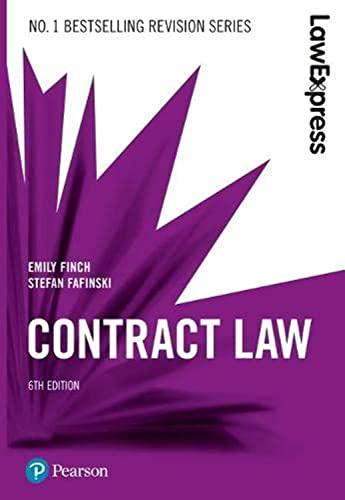Question
31. Statement 1. The subject matter of antichresis is movable properties. Statement 2. Only non-consumables can be given in commodatum. 2 points a. Both Statements
31. Statement 1. The subject matter of antichresis is movable properties. Statement 2. Only non-consumables can be given in commodatum.
2 points
a. Both Statements are TRUE
b. Both Statements are FALSE
c. Only Statement 1 is TRUE
d. Only Statement 2 is TRUE
32. Statement 1. Guaranty is a unilateral contract. Statement 2. A guarantor is allowed to appoint a sub-guarantor
2 points
a. Both Statements are TRUE
b. Both Statements are FALSE
c. Only Statement 1 is TRUE
d. Only Statement 2 is TRUE
33. Statement 1. Credit transactions are also known as contract of bailments. Statement 2. Bailor is also known as the creditor
2 points
a. Both Statements are TRUE
b. Both Statements are FALSE
c. Only Statement 1 is TRUE
d. Only Statement 2 is TRUE
34. Statement 1. In case the depositary delays its return, the depositary is liable for the loss of the thing through a fortuitous event. Statement 2. In deposit, when it is necessary to open a locked receptacle, the depositary is conclusively and absolutely presumed to have the authority to do so.
2 points
a. Both Statements are TRUE
b. Both Statements are FALSE
c. Only Statement 1 is TRUE
d. Only Statement 2 is TRUE
35. Three of the following are fundamental obligations of the agent. Which is the exception?
2 points
a. Can be the borrower if he is authorized to lend.
b. Sacrifice his interest and give it to the principal if there is a conflict
c. To render an accounting of the transaction.
d. Shall not carry out the agency even if that is the instruction, if he knew it would result in a loss or damage to the principal.
36. Three of the following are modes of extinguishing agency. Which is the exception?
2 points
a. Insanity of the principal.
b. Death of the principal, but the agency is for the benefit of a third person.
c. Accomplishment of the purpose of the agency.
d. Dissolution of the firm or corporation which entrusted or accepted the agency.
37. Bears the risk of collecting from the buyer the price of the sale.
2 points
a. Commission agent
b. Delegante
c. Quasi-tradition
d. Agente del credere
38. P appointed A as his agent with general powers on January 1. The next day, X transacted business with A. On January 5, P revoked the agency by publishing it in a newspaper of general circulation. On January 10, or five (5) days after the revocation was published, X consummated another transaction with A. Is the act of A in entering into another contract with X on January still binding against P?
2 points
a. Yes, because X is in good faith.
b. No, because the agency was already revoked and its publication is a sufficient warning.
c. No, because the power is just general and the act performed by A is an act of ownership which needs special power
d. Yes, because there was no special notice sent to X.
39. P appointed A as his special agent to sell a specific land for P10,000.00. P sends A his papers of appointment including a letter addressed to X notifying the latter of the appointment of A as his agent. Ten days after, P revoked the agency and published it in a newspaper of general circulation. X did not read the newspaper publication, but has got actual knowledge of the revocation. Later, A and X transacted business. Is the act of A binding against P?
2 points
a. Yes, because A and X are in good faith.
b. No, X having knowledge of the revocation is considered in bad faith.
c. Yes, because X was not given a general power hence the revocation through publication is sufficient.
d. Yes, since the appointment of A is by special information, the revocation must also be by special information in order that the same is effective.
40. P verbally appointed A as his agent to sell his parcel of land for P10,000.00. Five days after, A sold to B the parcel of land for P8,000.00 by means of public instrument executed between A and B. What are the effects and the status of the sale between A and B?
2 points
a. The sale is valid because it was executed in a public instrument.
b. The sale is unenforceable because the agent acted beyond the scope of his authority for selling the land for less than the price instructed.
c. The sale is void because the authority to sell is not in writing.
d. The sale is voidable because the contract of sale was not notarized.
Step by Step Solution
There are 3 Steps involved in it
Step: 1

Get Instant Access to Expert-Tailored Solutions
See step-by-step solutions with expert insights and AI powered tools for academic success
Step: 2

Step: 3

Ace Your Homework with AI
Get the answers you need in no time with our AI-driven, step-by-step assistance
Get Started


